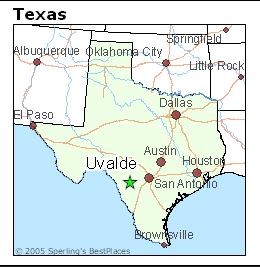I love short tales of historic episodes I hadn't heard before.
I taught history for many years and my students would love it when I would introduce a new Unit of History with a thrilling or humorous tale that would feature in the larger presentation of that era we were about to delve into.
I taught history for many years and my students would love it when I would introduce a new Unit of History with a thrilling or humorous tale that would feature in the larger presentation of that era we were about to delve into.
Below I provide a few such tales that I hope you'll enjoy.
Would love reading any unusual, unique tales from history you have to share.
Would love reading any unusual, unique tales from history you have to share.
Small Texas Town's History
Linked to Rogue Military General
I've been shocked and saddened by the tragic school shooting in Uvalde Texas on May 24, 2022.
Two months have passed and Uvalde remains strongly on my mind. And I got to thinking, I've yet to record a single bit of Texas History in this area of my blog.
I've been shocked and saddened by the tragic school shooting in Uvalde Texas on May 24, 2022.
Two months have passed and Uvalde remains strongly on my mind. And I got to thinking, I've yet to record a single bit of Texas History in this area of my blog.
Uvalde, Texas. Been there? I have. Once. Loved it.
I still treasure one of the first editions in my library that I discovered while browsing among antiques in a shop located in the lovely ol' Grand City Opera House (a historic site thankfully restored by the late Texas Governor and Mrs. Dolph Briscoe).
The city birthed not only this former governor but also actor Matthew McConaughey, actress Dale Evans, and former Speaker of the House and Vice President John Nance Garner.
Uvalde was founded by Reading Wood Black in 1853 as the town of Encina. In 1856, when the county was organized, the town was renamed Uvalde after Spanish governor Juan de Ugalde and was chosen as county seat. Geographically speaking, it is usually considered the "northerly part of South Texas" or the "southern limit of the Texas Hill Country".
Who was this Spanish governor from whom the town, the county, and, in fact the geographical region known as Ugalde Canyon gets its name? Well, let me tell you the story of the somewhat "rogue" Spanish General who wrecked havoc on the land of the Apaches.
Let's first establish the background of this man, provided on the Texas State Historical Association's site:
UGALDE, JUAN DE (1729–1816). This son of Brig. Gen. Miguel and Doña Catalina (González) de Ugalde
was born in Cádiz, Spain, on December 9, 1729.
He joined the Spanish army in 1738
and first saw action as a captain in 1743 against the Austrians in northern Italy.
From 1749 to 1757 he fought against the Moors in North Africa and,
during the Seven Years' War (1756–63), against the Portuguese.
He was promoted to lieutenant colonel and dispatched in 1764 to South America,
where he served as corregidor of Cochabamba, Bolivia, until 1772.
He returned to Spain in 1774 and was promoted to colonel,
and on March 26, 1776, King Charles III appointed him governor
of the province of San Francisco de Coahuila in northern New Spain.
Before leaving Spain, Ugalde was also appointed a knight in the Order of Santiago.
He officially took office as a governor in New Spain in the Americas on November 23, 1777.
His primary charge was to protect Coahuila from Indian attacks,
specifically from the Lipan and Mescalero Apaches.
Between May 3, 1779, and March 9, 1783,
Ugalde conducted four campaigns against the Mescaleros
in northern Coahuila and the Big Bend and Pecos River regions of Texas.
Impressive service to the Spanish crown, is it not?
Did you count the number of conflicts the man was involved in and recognition he received?
Yet, despite these laurels, Ugalde was not universally well-regarded - neither in the Americas or Spain. I could not help thinking of another controversial military figure when first reading about Ugalde, U.S. General Douglas MacArthur. Following the renown MacArthur achieved for his role in the Pacific theater of World War II, MacArthur would find himself in the new age of the Cold War in Korea and in hot water with a new U.S. administration, he would be summoned home and summarily reprimanded. When Ugalde departed Europe for New Spain, he too was entering a new world, a new age, a new conflict where, despite his previous service and accolades, he would find himself running rogue against an administration he held in low esteem, and eventually, would face a humiliating public reprimand.
The first reprimand came soon after the event on March 9, 1783. Recall from the quoted information above that Ugalde's "primary charge was to protect Coahuila from attacks..."? In Ugalde' view, a pre-emptive strike fit well within the parameters of this charge he had been given. Suffice to say, his superiors would think differently.
"For leaving Coahuila's settlements inadequately protected while on campaign,
Ugalde was relieved of all duties on April 17, 1783.
He would remain in Mexico City until August, 26, 1786..."
"In 1786 he was promoted to commander of arms of the Provincias Internas,
with authority over Coahuila, Nuevo León, Nuevo Santander, and Texas.
Again he took to the field in January of 1787
and combed his territory for Apaches..."
Ugalde's tactics against the Apache likely were adopted after his experience fighting in the North African campaigns that the Spanish fought against the Moors - summed up best as "the enemy of my enemy is my friend." Ugalde soon recognized the advantage in the Americas of joining forces with other Indian tribes who had long been terrorized by the Apaches. His efforts in building this coalition netted results.
"He signed peace treaties whereby several Apache groups
agreed to settle near his headquarters at Santa Rosa."
And for these successful negotiations, the "still dove-ish" Spanish government promoted Ugalde on December 3, 1787, to commanding general of the eastern internal provinces and he now had total command of Coahuila, Nuevo León, Nuevo Santander, and Texas.
But then things go awry once again. Again, because he took action for which he had not sought approval from the crown.
But then things go awry once again. Again, because he took action for which he had not sought approval from the crown.
"On August 20, 1789, he launched a lengthy campaign against the Apaches in West Texas within an area bounded by San Antonio, San Saba, and El Paso.
On January 9, 1790, he and his troops, with more than 100 Indian allies,
surprised and defeated 300 Lipan, Lipiyan, and Mescalero Apaches
at the Arroyo de la Soledad, the present Sabinal River canyon.
In commemoration of this victory, the battlefield was named the Cañón de Ugalde;
from it the city and county of Uvalde derived their names."
On January 9, 1790, he and his troops, with more than 100 Indian allies,
surprised and defeated 300 Lipan, Lipiyan, and Mescalero Apaches
at the Arroyo de la Soledad, the present Sabinal River canyon.
In commemoration of this victory, the battlefield was named the Cañón de Ugalde;
from it the city and county of Uvalde derived their names."
Ugalde's sucessful action in this battle turned some in the Spanish brass a pale shade of green. Jealous? Envious? Or, justifiably alarmed by his rogue behavior? Whatever the motivation, a political firestorm erupted, in the course of which came a change of viceroys and not only Ugalde's suspension in 1790 but his orders to return to Spain. Oy! Politics!
Old Soldiers Fade Away
Following his dismissal by President Truman for the rogue action he was taking that clearly conflicted with America's policy regarding the Korean conflict, General MacArthur famously exited, saying, "Old soldiers never die, they just fade away."
Following his dismissal by President Truman for the rogue action he was taking that clearly conflicted with America's policy regarding the Korean conflict, General MacArthur famously exited, saying, "Old soldiers never die, they just fade away."
"For thirty-seven minutes on April 19, 1951,
MacArthur held America in the palm of his hand.
MacArthur's address before a joint session of Congress,
one of the great moments in the early days of television,
MacArthur held America in the palm of his hand.
MacArthur's address before a joint session of Congress,
one of the great moments in the early days of television,
offered him a unique opportunity to tell his side of the story.
He did not disappoint.
Critics and much of the public soon saw through the holes in his arguments.
But his final words, drawing the curtain on an unparalleled military career,
surely rank as one of the great exit lines in American history."
Ugalde was provided no such platform, no such medium existed in his day that would allow such a personal defense of his actions in Texas.
"His service in the New World was characterized by rivalries,
political maneuvering, and abrupt reversals of fortune.
His aggressive military actions against the Indians
were pursued in disregard of the conciliatory policy of the colonial administration,
and it is debatable whether his campaigning pacified
or merely further antagonized the Apaches."
Ugalde would return to Spain, continuing in the only life he knew - serving in the Spanish military. He was awarded the Gran Cruz de San Hermenegildo in 1815. A year later, he would "quietly fade away," dying in Cádiz, Spain at the age of eighty-seven.
___________________________
Unless otherwise cited, quoted information taken from http://www.tshaonline.org/handbook/online/articles/fug01
Unless otherwise cited, quoted information taken from http://www.tshaonline.org/handbook/online/articles/fug01
_____________________________________________________

Posted: December 2013
CALIFORNIA SCHOOLS and THE GREAT WHITE FLEET:
JAPAN CRIES 'FOUL'!
JAPAN CRIES 'FOUL'!
A day that will live in infamy approaches,
December 7,
the anniversary of the bombing of Pearl Harbor by the Japanese in 1941.
Here, then, is this month's story behind the history...
U.S. President Theodore Roosevelt won the Nobel Peace Prize in 1906
after successfully bringing Japan and Russia to peace talks
following the Russo-Japanese War.
Both Russia and the Japanese (who had secretly requested Roosevelt intervene) expressed publicly their appreciation to the U.S. for its efforts in negotiating an end to their conflict.
But a year later, Japan was ready to go to war with the United States.
The reason: California school policy!
Japanese leaders contacted Roosevelt soon after he accepted his Nobel award,
indicating they were not pleased by San Francisco’s segregation of Japanese students. California was the port of entry for immigrants from Japan and China.
It was also the place where anti-Asian feelings ran strongest.
In October 1906, in the aftermath of the city’s great earthquake, as they reorganized and reopened the city’s schools, the San Francisco School Board adopted a policy of racial segregation for Chinese, Korean, and Japanese children.
The government of China protested but was too weak to do more.
In Japan, however, anger at the insult led to calls for war.
Roosevelt tried to convince Californians to rescind the segregation order
while encouraging the government of Japan to ignore the insult, but failed at doing both. However, in 1907 and 1908, he successfully negotiated the Gentlemen’s Agreement
by which the United States agreed not to pass any formal limit on Japanese immigration
and the Japanese government agreed to limit the emigration of laborers to the United States. For Japan, it was important not to face anything as insulting as
the Chinese Exclusion Act of 1882 had been.
For Californians, Roosevelt had accomplished the goal of establishing
a limit on Japanese immigration.
At the same time, Roosevelt used Japan’s threat of war to ask Congress
to appropriate funds to expand the U.S. Navy and then sent the
Great White Fleet—16 battleships painted gleaming white rather than navy grey—
around the world with a dramatic stop at Tokyo Bay.
The 1908 tensions with Japan had receded, though they were hardly ended.
Japan's leaders interpreted the arrival of the U.S. fleet in their bay as an affront
as well as the parking of that U.S. fleet in the Pacific a confrontational act.
It would spend the next 30 years building a new navy that could rival that of the U.S.
and resist "the dagger at our throat" (as it viewed the U.S. fleet parked in Pearl Harbor).
__________________________________
December 7,
the anniversary of the bombing of Pearl Harbor by the Japanese in 1941.
Here, then, is this month's story behind the history...
U.S. President Theodore Roosevelt won the Nobel Peace Prize in 1906
after successfully bringing Japan and Russia to peace talks
following the Russo-Japanese War.
Both Russia and the Japanese (who had secretly requested Roosevelt intervene) expressed publicly their appreciation to the U.S. for its efforts in negotiating an end to their conflict.
But a year later, Japan was ready to go to war with the United States.
The reason: California school policy!
Japanese leaders contacted Roosevelt soon after he accepted his Nobel award,
indicating they were not pleased by San Francisco’s segregation of Japanese students. California was the port of entry for immigrants from Japan and China.
It was also the place where anti-Asian feelings ran strongest.
In October 1906, in the aftermath of the city’s great earthquake, as they reorganized and reopened the city’s schools, the San Francisco School Board adopted a policy of racial segregation for Chinese, Korean, and Japanese children.
The government of China protested but was too weak to do more.
In Japan, however, anger at the insult led to calls for war.
Roosevelt tried to convince Californians to rescind the segregation order
while encouraging the government of Japan to ignore the insult, but failed at doing both. However, in 1907 and 1908, he successfully negotiated the Gentlemen’s Agreement
by which the United States agreed not to pass any formal limit on Japanese immigration
and the Japanese government agreed to limit the emigration of laborers to the United States. For Japan, it was important not to face anything as insulting as
the Chinese Exclusion Act of 1882 had been.
For Californians, Roosevelt had accomplished the goal of establishing
a limit on Japanese immigration.
At the same time, Roosevelt used Japan’s threat of war to ask Congress
to appropriate funds to expand the U.S. Navy and then sent the
Great White Fleet—16 battleships painted gleaming white rather than navy grey—
around the world with a dramatic stop at Tokyo Bay.
The 1908 tensions with Japan had receded, though they were hardly ended.
Japan's leaders interpreted the arrival of the U.S. fleet in their bay as an affront
as well as the parking of that U.S. fleet in the Pacific a confrontational act.
It would spend the next 30 years building a new navy that could rival that of the U.S.
and resist "the dagger at our throat" (as it viewed the U.S. fleet parked in Pearl Harbor).
__________________________________
Posted:October, 2013
The Winter That Changed the Cattle Industry ---
and played a role in determining a future U.S. President!
Did you know the winter of 1886–1887 was one of the worst in western history?
The melting snows did, however, produce lush grass for the survivors. The cattle business recovered, but it took different directions. Outside capital, so plentiful in the boom years, dried up. Ranchers began fencing their lands, reducing their herds, and growing hay for winter food.
The last roundup on the northern ranges took place in 1905. Ranches grew smaller, and some ranchers, at first in the scrub country of the Southwest, then on the Plains themselves, switched to raising sheep. By 1900, there were nearly 38 million sheep west of the Missouri River, far more than there were cattle." - Brands, American Stories, 3rd ed.
"Future president Theodore Roosevelt's cattle ranch in Dakota was wiped out by the severe winter. This event prompted him to abandon his ranching operations and return to the Eastern United States to continue his political career." - Wikipedia, Winter of 1886-87.
______________
Terry’s “Good Living” Guide:
Body:
Avoid the 3 PsBsSs
Processed Foods, Phthalates, Plastics
Avoid the 3 PsBsSs
Processed Foods, Phthalates, Plastics
Sedentary activities, Sugars, Salt;
Beef, Butter, Breads
Beef, Butter, Breads
Trust me,
you’ll be feeling better in no time!
you’ll be feeling better in no time!
Mind & Spirit:
Avoid the 3 F’s
Avoid the 3 F’s
False Prophets on Talk Radio,
FOX News, Facebook.
FOX News, Facebook.
Manufactured in these mediums are
misinformation, fear, anger and hate!
misinformation, fear, anger and hate!






No comments:
Post a Comment